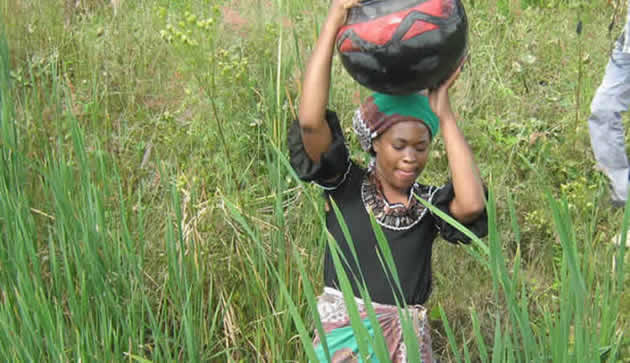Shamiso and the meaning of traditional marriage


Waking up well before sunset to sweep the courtyard, bring water, make a fire and offer all the immediate relatives water to wash their faces is part of the traditional chores a muroora is expected to do on her first official visit to her in-laws
Sekai Nzenza
Once inside the Mbuya’s big kitchen hut, under the paraffin light, an excited middle-aged man calling himself muzukuru, or nephew came in singing, shouting and teasing. ON the way to deliver my pregnant niece Shamiso to her husband’s village, we stopped half way and she cried, saying she did not want to go there.
With her was my cousin Piri and Mainini Jennifer, Shamiso’s mother’s niece. My counselling on the meaning of change in the everyday cycle of life did not help. Then we all tried to remind Shamiso that our family had accepted bride price from Philemon, Shamiso’s husband. Not only that, Piri and I, as the aunts, vanatete, had willingly and proudly picked the bride price potion of the money celebrating the marriage of Shamiso, our daughter. Much as we felt sorry for her, we still had an obligation to deliver her to her husband’s people.
That was tradition and it has always been that way, we said. Piri said, “You are not the first woman to leave her village and marry somewhere far. Ever since time immemorial, women married and left home to join their husband’s families. That was the life.”
With her eyes red, heaving and coughing, her big abdomen moving up and down, Shamiso said, “But in the old days, husbands always lived with their wives. They did not leave the village to spend the whole day selling airtime in the city.” That was true before the arrival of the white man, we told Shamiso. When colonialism came, men were forced to leave the village and look for work to pay hut, land, dog, bicycle, cattle and other taxes. Some men even travelled as far as Johannesburg and worked in the mines in Wenera. They did not come back home for many years. And yet, their wives stayed with the in-laws. They were faithful. Shamiso was going to do the same. In fact, she should count herself lucky that Harare was not like the Diaspora where a lot of our men had disappeared to. Shamiso cried even more.
There was momentary silence. I kept on eating mazhanje, making a mess on the ground. Piri grabbed a beer from the cooler box in the car, sipped it in between eating mazhanje and spat out the seeds loudly. What were we going to do? It was not proper, that two aunts, vanatete, who accepted and ‘ate’ their share of the bride price, should suddenly make a U-turn and return the bride back home. No. We were going to follow tradition and deliver Shamiso and her pregnancy to Philemon’s family. It was their pregnancy, their wife. Shamiso was no longer ours.
Then Mainini Jennifer had a spiritual intervention. Being a member of the Apostolic Faith, mupostori, she suddenly said we should bow our heads in prayer because she could sense the presence of the devil. He was now at work, influencing Shamiso to see only the bad things in marriage. Piri put away her beer.
Right there, in the middle of the bush, going past Buhera towards Bocha, Mainini Jennifer knelt down facing east and sang a song called Alleluia Hosanna. We knelt down too and hummed along with her. Then she pulled out a Bible from her hand bag and read from the book of Ruth. It was the story of Naomi and her husband Elimelech. They left for the land of Moab. Over there, Elimelech and the two sons died, leaving Naomi with her two daughters-in-law, Orpah and Ruth. Naomi decided to go back to Moab and told her daughters-in-law to remain among their own people. But Orpah and Ruth insisted on going with her. Then Orpah chose to remain but Ruth said, no, she would not part with Naomi. In the King James Version Bible, Chapter 1, verse 16, Ruth spoke to her mother-in-law and saying: “Entreat me not to leave you, Or to turn back from following after you; For wherever you go, I will go; And wherever you lodge, I will lodge; Your people shall be my people, And your God, my God. 17 Where you die, I will die, And there will I be buried. The Lord do so to me and more also, if anything but death parts you and me.” In verse 18, Naomi sees the determination of Ruth. She stopped talking to her and they proceeded to Judah together.
Piri was listening seriously. She almost looked spiritual, except for the smell of beer coming from her breath when she tried to sing. Mainini Jennifer spoke about loyalty in marriage and encouraged Shamiso to have the faithfulness of Ruth. Although the Bible passage referred to the loyalty between a mother-in-law and a daughter-in-law, it was loyalty all the same. After two more prayers, we could see Shamiso looking relieved and relaxed. Then we proceeded with our journey, arriving in Bocha, Philemon’s home, at sunset.
We did not go straight into the village court yard because that was not done. A ceremony to welcome the bride, kupururudza muroora, was in order. We parked our car on the edge of the homestead, waiting to be noticed. Then we covered Shamiso with a big cloth. Just when we it was getting very dark, several people, mostly women and children, came to greet us. As we walked slowly towards Mbuya Chiseko, Philemon’s grandmother’s house, the traditional song about the bride coming home with all her blankets was started by someone in the crowd. “Tauya naye muroora. Tauya naye nemagumbeze!” There was much excitement, dancing and singing.
Piri directed Shamiso’s steps, ordering her to stop frequently and only walk when one dollar was paid each time. That was the custom. Few dollars later, we arrived at the door step and refused to move until a full ten dollar note was paid. Mbuya Chiseko ululated and danced, saying finally she has a companion to bear children, cook, and plough, fetch water and take over the home when she departs to the ancestor world.
Once inside the Mbuya’s big kitchen hut, under the paraffin light, an excited middle-aged man calling himself muzukuru, or nephew came in singing, shouting and teasing. As Philemon’s muzukuru, he said he was so happy to welcome his aunt because according our custom, when Philemon dies, he would inherit Shamiso as wife. We all laughed and shook hands with him. Then muzukuru paid $5 and with that amount, he demanded to see his ‘wife’ face. We uncovered Shamiso. She kept her head down and muzukuru pulled her chin up and said, “Maiwe, zvariiri getsi!” meaning she was so beautiful like the light or sunshine. But those whose role was to tease as a way of welcoming Shamiso said she was ugly, too light skinned, skinny, small, lazy looking and weak. Laughing and touching her gently they said, “Ah, kakaonda, katsvukuku, kanoroya, hakarime, kakanaka, kane nhumbu hombe asi kadikiki”. Shamiso cried and we calmed her, saying that it was our custom to say the nasty things that are likely to be said in gossip. This way, all negative talk was out in the open, right from the beginning. They must scold and laugh at her. This was all meant to make her feel at home.
The following morning, Mainini Jennifer and Piri woke up well before sunset to sweep the courtyard, bring water, make a fire and offer all the immediate relatives water to wash their faces. I kept Shamiso’s company. Then I asked Mbuya Chiseko and muzukuru if I could to check out the village compound and surroundings, kumema musha. It was my role as the observer and investigator tete, to assess the family that Shamiso had married into. I moved around slowly and silently checking the size of the granary, an indicator of a good farming family. I went to cattle pen and counted the number of cattle, goats, chickens, guinea fowls, turkeys and also the health of the dogs.
Skinny dogs are a sign of hunger or cruelty to animals. I checked if there any disabled people so we know if there was a problem gene in the family. Any mad looking people around? How many people would Shamiso cook for in Mbuya Chiseko’s house?
I also asked muzukuru and other people the distance walked to collect water and firewood.
The distance to the nearest bus stop, grinding mill, shops, school, health centre and church. Above all else, I wanted to know if there was anyone from the Eland, Vahera clan, so we can introduce ourselves and Shamiso. They will automatically become her nearest relatives. In the late afternoon, we departed, leaving Shamiso with Philemon’s grandmother, Mbuya Chiseko.
Ten days later, Shamiso sent her first message on “WhatsApp” begging us to come and get her because life in Bocha was too hard.
I called Piri and she said, “How do we take Shamiso away from her husband’s people? Where do we take her?”
- Dr Sekai Nzenza is a writer and cultural critic. She holds a PhD in International Relations and works as a development consultant.










Comments